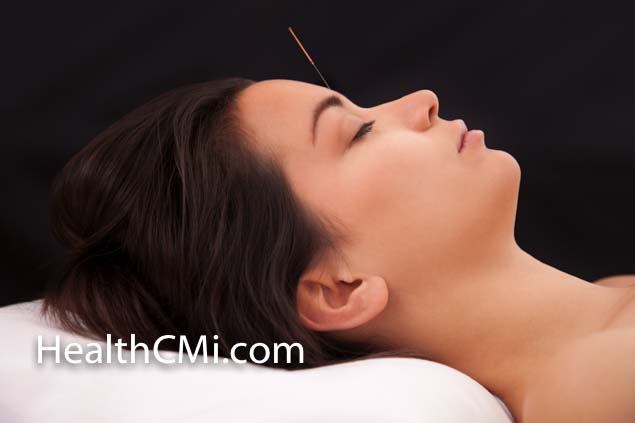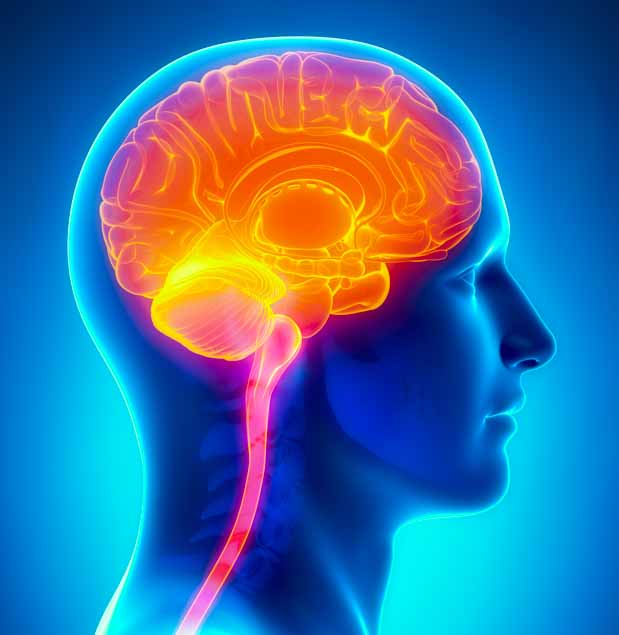Clinical trials demonstrate that acupuncture improves cognition and memory for dementia patients.
Controlled investigations reveal that acupuncture outperforms drug therapy for the treatment of vascular dementia. Acupuncture was found both safe and effective, however, specific acupuncture protocols were found superior to conventional treatments. Multiple studies indicate that the micro-acupuncture system termed scalp acupuncture is particularly beneficial to vascular dementia patients.
 Acupoint Yintang
Acupoint Yintang
Acupuncture alleviates dementia more effectively than conventional drug therapy according to researchers at the Wuhan University of Science and Technology. Published in the Journal of Hubei University of Chinese Medicine, their research demonstrates that acupuncture is both safe and effective for the treatment of vascular dementia. Acupuncture achieved a 90% total effective rate when using the Xing Nao Kai Qiao acupuncture protocol. Conventional acupuncture achieved an 80% total effective rate and drug therapy achieved a 60% total effective rate.
In vascular dementia, impaired blood flow deprives oxygen and nutrients to the brain; mental deterioration affects cognition, memory, language skills, emotions, and personality. The researchers cite Traditional Chinese Medicine (TCM) theory as the basis for their acupuncture protocol development. The Huangdi Neijing (Yellow Emperor's Inner Canon) states that the governor meridian (Du Mai) is related to the brain and marrow in the Suwen section. Also, Jing Mai theory in the Lingshu section indicates that the bladder meridian (Foot Tai Yang) is closely related to the brain. Additional TCM theory indicates that the scope of vascular dementia involves deficient liver and kidney qi and blood, phlegm stagnation, and qi and blood stasis.
Three groups were compared. The drug therapy group received 0.8 g tablets of piracetam, a gamma-aminobutyric acid (GABA) derivative, three times per day for thirty days. Piracetam is a neurotransmitter derivative that is a central stimulant and a nootropic agent (a drug used to enhance memory or cognition). Piracetam is neuroprotective, anticonvulsant, and improves neuroplasticity.
The conventional acupuncture group was needled at the following acupoints:
- Baihui, DU20
- Sishencong
- Fengchi, GB20
- Shuigou, DU26
- Quchi, LI11
- Zusanli, ST36
- Juegu, GB39
- Taixi, KD3
The Xing Nao Kai Qiao acupuncture treatment consisted of body and scalp acupuncture points. Body style acupoints included:
- Neiguan, PC6
- Renzhong (Shuigou), DU26
- Yintang
Scalp acupoints included the following:
- middle line of vertex at Qianding (DU21) towards Baihui
- middle line of forehead at Shenting (DU24)
- both sides of the lateral line 1 of vertex at Chengguang (BL6)
- emotional area (2 cm laterally to the anterior median line and 2 cm within the hairline)
All acupuncture protocols were applied to patients once per day, six days per week, for a total of thirty days. The results demonstrated that acupuncture outperformed drug therapy. An interesting look towards the future would be an additional study combining piracetam with acupuncture in an integrative protocol to determine if positive patient outcomes increase.
In related MRI research, Wang et al. conclude that acupuncture “can enhance the hippocampal connectivity in AD [Alzheimer disease] patients.” The study measured regions of disrupted brain connectivity in AD patients. After acupuncture, the MRIs demonstrate that AD patients had significant improvements in connectivity for frontal and lateral temporal regions of the hippocampus. The study incorporated fMRI technology to measure the effects of acupuncture points LV3 (Taichong) and LI4 (Hegu) on the brain.

In a related multi-center randomized controlled trial of 184 human subjects with vascular dementia, Huang et al. conclude that acupuncture is an effective treatment modality. Huang et al. conclude that scalp acupuncture significantly improves cognition, activities of daily living, TCM signs and symptoms, mental state, and social behavior for vascular dementia patients.
Gang et al. find acupuncture more effective than almitrine (Duxil) for the treatment of vascular dementia concluding, “The efficacy of treating vascular dementia gait disorder with electro-acupuncture (EA) on EX-B2 along lumbar vertebra combined with scalp acupuncture was superior to orally administered Duxil.” This may be explained in part by the work of Shi et al., whose investigation of vascular dementia patients concludes “that acupuncture is beneficial at least in part by preventing oxidative damage.”
The research of Feng et al. on vascular dementia patients may also explain the biological mechanisms activated by acupuncture. CREB (cAMP response element-binding protein) and BDNF (brain-derived neurotrophic factor) act in long-term memory storage. Feng et al. note that acupuncture at DU20 upregulates both BDNF and CREB. Feng et al. add that acupuncture at DU20 “significantly increases the levels of choline acetyltransferase (ChAT) and restores the expression of choline transporter 1 (CHT1) and vesicular acetylcholine transporter (VAChT).” This indicates that acupuncture treats cognition and memory disorders, at least in part, by regulating brain cholinergic functioning.
References:
Mao QJ. (2015). Clinical Observation of Xingnaokaiqiao Acupuncture Combined with Scalp Acupuncture in Treatment of Vascular Dementia. Journal of Hubei University of Chinese Medicine. 17(4).
Chen JP & Lin Y. (2002). Treatment of Dementia. Beijing: People's Medical Publishing House. 139.
Wang, Zhiqun, Peipeng Liang, Zhilian Zhao, Ying Han, Haiqing Song, Jianyang Xu, Jie Lu, and Kuncheng Li. "Acupuncture Modulates Resting State Hippocampal Functional Connectivity in Alzheimer Disease." PloS one 9, no. 3 (2014): e91160.
Shi, G. X., C. Z. Liu, Wei Guan, Z. K. Wang, Lei Wang, Chuan Xiao, Z. G. Li, Q. Q. Li, and L. P. Wang. "Effects of acupuncture on Chinese medicine syndromes of vascular dementia." Chinese journal of integrative medicine (2013).
Huang, Lin-na, An, Jun-ming, Su, Tong-sheng; Wang, Pu; Dong, Lan; Zhang, Ruo-ping; Ren, Yu-juan; Ren, Yuan-yuan. Therapeutic efficacy observation on scalp acupuncture for vascular dementia. Journal of Acupuncture and Tuina Science. 2012-02-01. Shanghai Research Institute of Acupuncture and Meridian Co-published with Springer-Verlag GmbH. 1672-3597. Volume: 10. Issue: 1. Doi: 10.1007/s11726-012-0567-z.
Gang, F. E. N. G. "Observation on efficacy of treating vascular dementia gait disorder with electro-acupuncture (EA) on Jiāj (EX-B2) along lumbar vertebra combined with scalp acupuncture." World Journal of Acupuncture-Moxibustion 24, no. 2 (2014): 1-5.
Shi GX, Liu CZ, Li QQ, Zhu H, Wang LP. Acupuncture and Moxibustion Department, Beijing Hospital of Traditional Chinese Medicine affiliated to Capital Medical University, Beijing, China. Journal of Traditional Chinese Medicine. 2012, 32(2):199-202.
Feng, Shuwei, Yulan Ren, Shilin Fan, Minyu Wang, Tianxiao Sun, Fang Zeng, Ping Li, and Fanrong Liang. "Discovery of Acupoints and Combinations with Potential to Treat Vascular Dementia: A Data Mining Analysis." Evidence-Based Complementary and Alternative Medicine 501 (2015): 310591.


